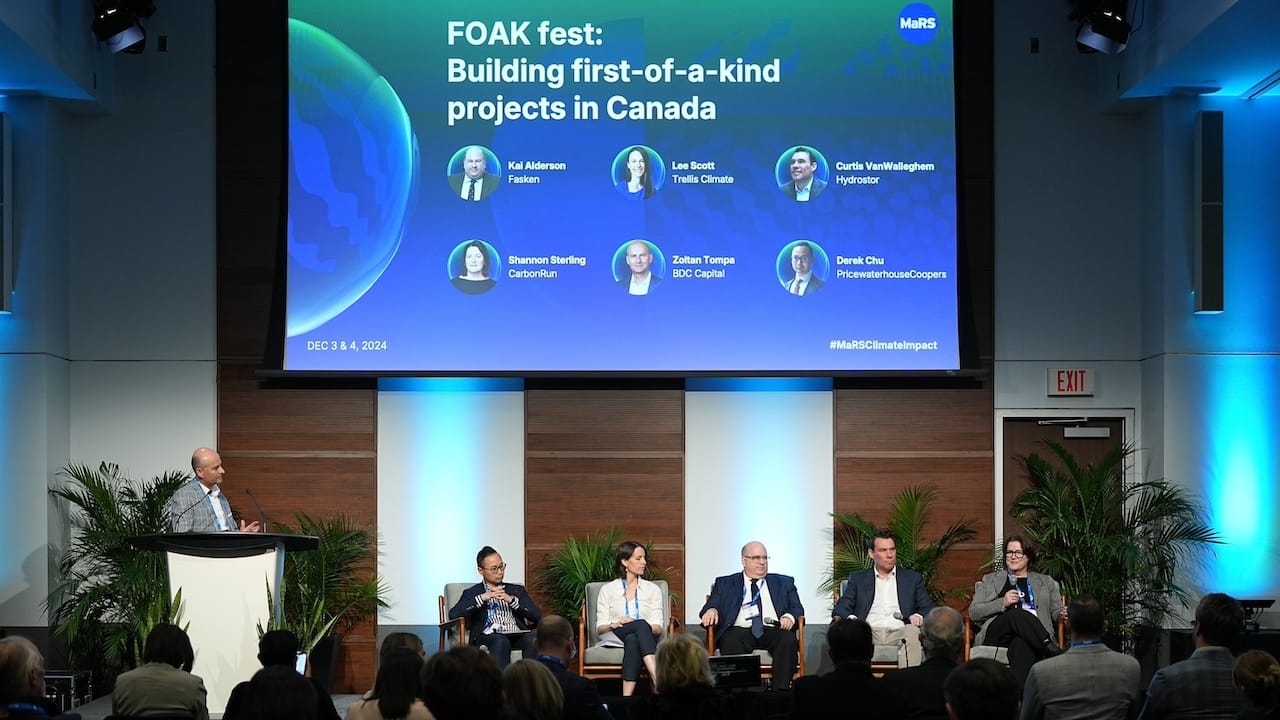Hey there,
We’re well into December now and while it’s tempting to drop the old “let’s circle back in the new year”, we’re not quite done with 2024. We’re bringing the podcast back starting next week with Dr. Ron Dembo, founder and CEO at RiskThinking, to talk all things climate risk, AI, and dealing with an uncertain future.
Subscribe here to get the episode when it drops!
This week, we’re recapping the MaRS Climate Impact conference that took place in Toronto last week. Scaling up was the recurring theme across talks from FOAK to wildfire tech.
Elsewhere in climate, Genuine Taste won top spot in Spring’s Invest Together program, the DOE races to deploy climate capital, and Canada invests more than $1B in clean energy projects.
Finally, if you like what we’re doing with Climate Tech Canada you can support our work by sharing it with a friend. Forward this email or grab the link below to share:
TECH
Dispatch from MaRS: Scaling Canadian climate tech

Source: MaRS
Climate founders and investors met in Toronto last week for the MaRS Climate Impact conference. It’s one of (if not the) largest climate tech gathering in Canada and brought together founders, VCs, institutional capital, and folks from across the industry.
The incoming Trump admin was top of mind for many folks but didn’t suck all the air out of the room. Talks focused on the challenges of scaling up, establishing first-of-a-kind projects, and coalition building:
🌎 Climate tech in a post-election world
ArcTern Ventures’ Tom Rand kicked off the conference talking about the impact of U.S. elections. While Trump might want to “stop the tech genie” - it’s out of the bottle according to Rand. The danger isn’t that a Trump admin stops climate progress, but how fast we act.
Biden's work on the IRA created a new kind of conversation about climate, one focused on economics, permitting and infrastructure. The conversation on cleantech will shift from a theoretical “we will deliver economic progress” to a reality.
To do this, we need to get going. Full net zero looks hard - the last 20% will be very expensive - but worrying about that future challenge risks stopping us from working on the first 60% that could be deployed right now.
🏭 Scaling up materials
Materials founders from CERT Systems, HyC Light, RXN Hub, and Boston hardtech VC firm Engine Ventures talked about the challenges in creating - and scaling - climate solutions with atoms.
To win, hard tech companies need a coalition around. That means getting the right offtake agreements, power agreements, lab space, etc. These partners can have the added benefit of offering interesting funding options beyond VC.
According to RXN Hub’s Morgan Lehtinen, 40% of capital raised by materials startups goes to capital costs. The hub was founded to help materials startups scale efficiently through TRLs and use their hard-fought funding more effectively by offering purpose-built space.
The right founder-funder fit matters. Engine Ventures’ Rachel Field said both need to be clear on the company’s north star because hardtech is a long-term play. Showing the concrete steps along the way and that the fundamentals are in place at every step builds trust.
🚧 Breaking ground on FOAKs
Hydrostor CEO Curtis VanWalleghem walked through their long road to scaling up: from VC funding to run a pilot in the Toronto harbour, then on to lobbying the IESO for battery storage, building a development team in-house, taking on equity, project financing, loans from EDC and much more. It’s taken multi-year orchestration to unlock upcoming billion-dollar projects.
Thinking about project development like you would technical debt. You’ll make trade-offs to go fast, but have to pay them down later. E.g. who owns the environmental attributes from the project and gets to claim them? Who owns the land? Who gets the offtake? Startups should be future aware when making these decisions while moving quickly.
There’s a big focus on permitting, but social license matters just as much. Bringing in Indigenous partners is key for any project in Canada - not just during consultation.
Key takeaways:
Optimism. The U.S. election adds new headwinds for climate tech, but the overall sentiment is that it’s far from a death blow. From the more resilient parts of the IRA, to markets like Asia that are ready to fill the market void (Michael Gryseels of Antares Ventures noted that Asia has committed $5T while the IRA was about $500B), there’s lots of opportunity on the table. To quote Ayrton Energy founder Natasha Kostenuk, “I’m building a company that’s bigger than the next four years”.
It takes a village. The funding conversation is evolving as startups look at the different sources of capital they can assemble, particularly as they scale up. From project financing to philanthropy to creative offtake agreements and corporate partnerships, assembling the right funders, advisors and partners is key.
Visionary opportunities. There are so many challenges ripe for a national, all hands on deck mission. In a panel on wildfire tech, FireRein founder Zackery Hodgen called out the opportunity for Canada to be a leader in firefighting by integrating the many solutions at a national scale. The same could be said for buildings, carbon removal, etc.
Be bold. It’s the classic Canadian tech conference line, but bears repeating. For founders, being able to sell the vision matters, not just the nuts and bolts. Particularly in hardtech where it’s going to take years to realize the end vision. But investors also need to step up and back those bold visions.
Enjoying the newsletter? Help spread the word!
Share Climate Tech Canada with your network and earn rewards.
CLIMATE CAPITAL & MILESTONES
🏭 Acceleware received $1.31 million in non-dilutive funding from the Clean Resource Innovation Network. Acceleware uses electromagnetic heating to improve energy efficiency and avoid wasted heat in industrial processes.
🧪 Genuine Taste won Spring Capital’s Invest Together in Climate Innovation program. Genuine Taste is developing cultivated fats to improve the taste and texture of plant-based meats and pet food.
🏅 Litus won the Series A pitch award at MaRS’ Climate Impact conference for their lithium brine extraction tech. Aslan Renewables won the Seed pitch award, while Hyperion Global Energy and Evoco also took home prizes.
📊 dMRV startup Mangrove Systems partnered with carbon credit registry Isometric to issue credits.
↪ Li-Metal intends to change its business model to switch from developing battery materials to investments in order to weather “current market dynamics”.
🔋 Battery recycler Li-Cycle started exploring a new “Hub” recycling plant in Italy. The project would leverage existing infrastructure from Glencore, an investor in Li-Cycle.
IN THE NEWS
⚡ Feds announce more than $1 billion for clean energy projects. Projects in Saskatchewan and New Brunswick include Indigenous-led wind projects through the Canada Infrastructure Bank, $25M for small modular reactors, and grid resiliency projects like demand side management and rebuilding aging infrastructure.
🧑⚖ First Nations are taking carbon pricing to court. The Indian Resource Council and some Treaty Six chiefs said they weren’t consulted properly and that carbon pricing impacts their communities disproportionately, as many people living on reserves won’t receive the rebate and have to rely on high-emitting fuels.
🏢 Ontario developers are suing Toronto for its green building standards. The group is questioning the city’s authority to implement building standards which it says are increasing costs and complexity. The province has delayed introducing higher building standards, despite buildings making up 24% of Ontario’s emissions.
🔋 A billion-dollar battery plant in B.C. is on pause. E-One Moli Energy stopped construction to focus on production efficiency in its home market of Taiwan. Canadian governments promised $284.5M for the expansion.
🧪 Alberta to invest in improved lab access for early-stage ventures. Funded from Alberta’s industrial carbon pricing system, the program will subsidize the cost of lab space at universities for Alberta-based startups focused on reducing emissions.
BIG PICTURE
The DOE is racing to deploy cleantech dollars
Meta put out a call for 4GW of nuclear power, followed by plans to build its largest data centre yet with fossil fuels
A rocky year for Europe’s climate tech startups
Low-lying clouds could be the key to faster global warming
China hits back against U.S. tariffs with export ban on key minerals for chips, solar panels
2024 saw the fewest climate tech exits since 2020
Data centres will provide heating for some Silicon Valley apartments
COMMUNITY
📊 Active Impact Investments is hiring an Investment Team Analyst. It’s an opportunity to break into VC at one of Canada’s top climate funds.
💼 CarbonHound is hiring a Business Development & Marketing Specialist to help small businesses measure and reduce their impact on the climate.
🪸 Coastal Carbon is hiring a Chief of Staff & Director of Business Development to commercialize their model of the natural world for conservation, carbon dioxide removal, and government.
➡️ Find more open roles.
Share Climate Tech Canada with your network and help us grow! Make {{ rp_num_referrals_until_next_milestone }} referrals to get a {{ rp_next_milestone_name }}. See all rewards here.
